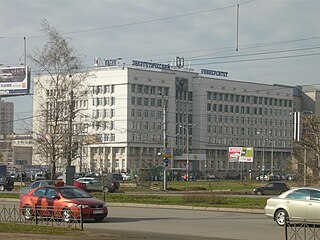
Tatarstan, officially the Republic of Tatarstan, sometimes also called Tataria, is a republic of Russia located in Eastern Europe. It is a part of the Volga Federal District; and its capital and largest city is Kazan, an important cultural centre in Russia. The region's main source of wealth is oil with a strong petrochemical industry.

Kazan Federal University is a public research university located in Kazan, Russia.

Yelabuga is a town in the Republic of Tatarstan, Russia, located on the right bank of the Kama River and 200 kilometers (120 mi) east from Kazan. Population: 70,728 (2010 Census); 68,663 (2002 Census); 53,537 (1989 Census).

The culture of Tatarstan is molded from the culture of Volga Tatar people, Russian, and European culture.
Baku Slavic University (BSU) is a public university located in Baku, Azerbaijan.
Tatar State University of Humanities and Education is a university in Kazan, Russian Federation. It was formed in 2005 by a merger of several institutions, some which had a particular focus on the use of Tatar as a medium of instruction or the study of the language itself, for example the Kazan State Pedagogical University and Tatar State Humanities Institute.

Yelabuzhsky District is a territorial administrative unit and municipality of the Republic of Tatarstan within the Russian Federation. The district is located in the north-east of the republic and occupies an area of 1362.1 square kilometers. According to the 2010 census, the municipality had a population of 81,632. The main city Yelabuga is not included within the administrative structure of the district.

Orel State University or Turgenev State University of Oryol, officially Orel State University named after I.S. Turgenev, formerly Oryol State Pedagogical Institute, is a university in Central Federal district of Russia in the city Oryol which is the Administrative centre of Oryol Oblast. OSU opened in 1931 as Industrial-Pedagogical Institute. Today OSU is a member of Association of the Classical Universities of Russia.
Kazan State University of Culture and Arts (KazSUCA) is located in Kazan, Tatarstan, Russia. It was founded in 1969 as a branch of the Leningrad State Institute of Culture. It became the Kazan State Institute for Culture in 1974 and was named the Kazan State Institute for Culture and Arts in 1991. It acquired the status of an academy in 1995. On July 4, 2002, it acquired university status and became the Kazan State University of Culture and Arts.

The Vinnytsia Mykhailo Kotsiubynskyi State Pedagogical University is a university located in Vinnytsia, Ukraine. The university was established in 1912. The staff includes 30 professors along with a further 33 holders of Doctor of Science qualifications.

The Dragomanov Ukrainian State University is a Ukrainian higher education institution in Kyiv, which has III-IV accreditation level. It is named after Mykhailo Drahomanov.

The Precarpathian National University is a public research university in Ivano-Frankivsk. It is one of the oldest institutions of higher education in Western Ukraine.

Kherson State University is one of the oldest universities, and а versatile educational, scientific, pedagogical, and cultural centre of southern Ukraine.
N.I. Lobachevsky Institute of Mathematics and Mechanics - N.I. Lobachevsky Institute of Mathematics and Mechanics – one of Kazan Federal University’s Institutes. It was established in 2011 at the premises of the Faculty of Mechanics and Mathematics including N.G.Chebotarev Research Institute for Mathematics and Mechanics and the part of TSUHE’s Faculty of Mathematics. The Institute has Bachelor program, Master program, Postgraduate and Doctoral studies.

Institute of Philology and Intercultural Communication, formerly Kazan Imperial University, is a higher educational institution of Kazan, one of the largest institutes of Kazan Federal University. IPIC has more than 4500 students, 300 teachers and staff members, including 58 Ph.D and 175 candidates of sciences, 11 teachers from foreign countries. The Institute comprises 3 academic divisions: the Leo Tolstoy Higher School of Russian and Foreign Philology, the Gabdulla Tukay Higher School of National Culture and Education and the I.A. Baudouin de Courtenay Higher School of Russian Language and Intercultural Communication. The Institute trains philologists and educators with expertise in linguistics, literary studies, Russian, Tatar and foreign languages, interpretation and translation, educational technologies, design, music, and choreography.

Rina Zaripova was a Tatar journalist, translator, teacher, Merited Culture Worker of Tatarstan Republic (1995), and prizewinner of the competition for journalists "Bällür qäläm", or "Crystal pen" (2001).

Pskov State University is a public university in the Pskov Region of Russia. It is one of the 33 flagship universities in Russia. Pskov SU was established in 2010 by several other educational institutions in the region.
Nizhny Tagil State Socio-Pedagogical Institute is a higher education institution founded on 27 June 1939 to train highly qualified teaching staff. Reorganized on 28 August 2013 by joining the Russian State Vocational Pedagogical University.

The Kazan State Power Engineering University is a public instite in Kazan, Tatarstan, Russia. It trains specialists in the power engineering and is one of three such universities in Russia.
Liya Zakirovna Shakirova was a Soviet and Russian linguist, professor of pedagogical science and teacher-methodologist. She worked at Kazan State Pedagogical Institute from 1948 until her retirement in 2003 and authored approximately 420 scientific articles that included textbooks on Russian language teaching methology, teaching methods and manuals for students and teachers at universities. Shakirova received the Order of Lenin, the Medal "Veteran of Labour" and the Medal "For Valiant Labour in the Great Patriotic War 1941–1945" in her lifetime.














